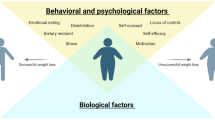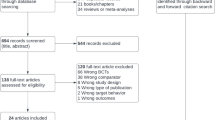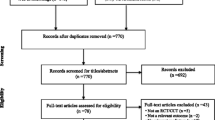Abstract
Excess consumption of dietary fat promotes chronic disease such as heart disease and cancer. Dietary analysis and feedback are often used to motivate dietary change; however, little is known about how people process, react to, and use this feedback to change behavior. This study used a randomized feedback design to examine psychological reactions to dietary fat feedback. Subjects were assessed for fat consumption and then randomly assigned to a high, moderate, or low percentage of calories from fat feedback group. Findings indicate that there are strong emotional, cognitive, and behavioral reactions to providing high-fat dietary feedback. Subjects that were told their diets were high in fat reported stronger negative emotional reactions and also reported they had stronger intentions to change than the other two feedback categories. These results are compared with studies providing nonrandomly assigned risk factor feedback.
Similar content being viewed by others
REFERENCES
American Cancer Society (1984). Nutrition, Common Sense, and Cancer. American Cancer Society, Atlanta, GA.
American Cancer Society (1996). Cancer Facts and Figures—1996, American Cancer Society, Atlanta, GA.
Blum, C. B., and Levy, R. I. (1987). Role of dietary intervention in the primary prevention of heart disease. Cardiology 74: 2–21.
Bowen, D. D., Fries, E., and Hopp, H. P. (1994). Effects of dietary fat feedback on behavioral and psychological variables. J. Behav. Med. 17: 589–604.
Croyle, R. T., and Jemmott, J. B. (1991). Psychological reactions to risk factor testing. In Skelton and Croyle, R. T. (eds.), Mental Representation in Health and Illness, Springer-Verlag, New York.
Croyle, R. T., Sun, Y. C., and Louie, D. H. (1993). Psychological minimization of cholesterol test results: Moderators of appraisal in college students and community residents. Health Psychol. 12: 503–507.
Department of Health and Human Services (1990). Publication No. (PHS) 91-50212, Government Printing Office, Washington, DC.
Fries, E. A., Hopp, H. P., and Bowen, D. J. (1991). Does nutritional feedback change behavior? Long-term reactions to dietary fat feedback. Paper presented at the annual meeting of the American Public Health Association, Washington, DC.
Greene, G. W., Rossi, S. R., and Reed, G. R. (1993). The effect of feedback on dietary intent to reduce fat. Topics Clin. Nutr. 9: 20–23.
Hopp, H. (1991). Cholesterol Labeling: Psychological Responses to Risk Factor Feedback, Unpublished doctoral dissertation, University of Washington, Seattle.
Kristal, A. R., Shattuck, A. L., Henry, H. J., and Fowler, A. S. (1990). Rapid assessment of dietary intake of fat, fiber, and saturated fat: Validity of an instrument suitable for community intervention research and nutritional surveillance. Am. J. Health Promo. 4:288–295.
National Center for Health Statistics (1994). Daily dietary fat and total food-energy intakes: Third National Health and Nutrition Examination survey, Phase I, 1988–1991. Morbid. Mortal. Week. Rep. 43: 117–125.
Patterson, R. E., Haines, P. S., and Popkin, B. M. (1994). Diet quality index: Capturing a multidimensional behavior. J. Am. Diet. Assoc. 94: 57–64.
Taylor, S. E., and Brown, J. B. (1988). Illusion and well-being: A social psychological perspective on mental health. Psychol. Bull. 103: 193–210.
United States Department of Health and Human Services (1990). Healthy People 2000, USDHHS Publication No. 91-50212, Washington, DC.
Weinstein, N. D. (1987). Unrealistic optimism about susceptibility to health problems: Conclusions from a community wide sample. J. Behav. Med. 10: 481–500.
Author information
Authors and Affiliations
Rights and permissions
About this article
Cite this article
Fries, E.A., Bowen, D.J., Hopp, H.P. et al. Psychological Effects of Dietary Fat Analysis and Feedback: A Randomized Feedback Design. J Behav Med 20, 607–619 (1997). https://doi.org/10.1023/A:1025522625793
Issue Date:
DOI: https://doi.org/10.1023/A:1025522625793




